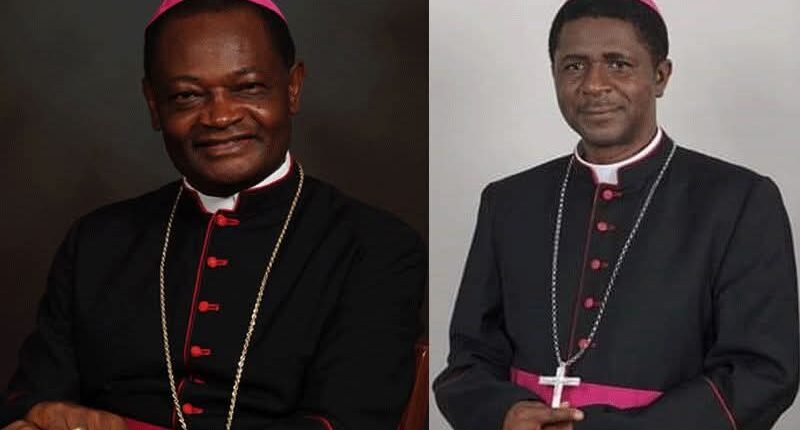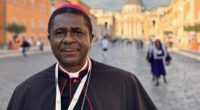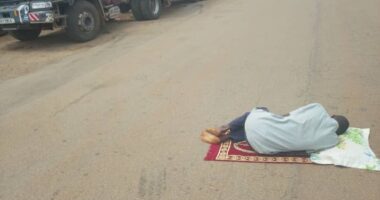Prophetic Fire Ignites: Lay Faithful Unleash Canonical Thunder on Archbishop Nkea’s Alleged Betrayal in the Heart of the Anglophone Struggle
Exclusive Analysis by Mark Bareta for BaretaNews
Fellow Ambazonians and freedom fighters, in the shadowed valleys of our ongoing liberation war against the Yaoundé regime’s genocidal grip, a new front has erupted—not on the battlefields of Ground Zero, but within the sacred halls of the Catholic Church itself. What we are witnessing is nothing short of a prophetic uprising from the lay faithful, armed not with rifles but with the unyielding sword of Canon Law, Magisterial teachings, and biblical truth. In a riveting exchange dated November 23 and 24, 2025, Mr. Frederick Kigha and Canon Law jurist Nchumbonga George Lekelefac have delivered a blistering indictment against Archbishop Andrew Fuanya Nkea of Bamenda, accusing him of trading his mitre for the regime’s blood money. This correspondence, obtained exclusively by BaretaNews, exposes the rot at the core of ecclesiastical compromise and reignites hope that the Church’s true voice—the voice of the oppressed—will not be silenced.
Let me break this down for you, step by step, as we dissect this moral earthquake that could reshape the spiritual landscape of Southern Cameroons. At its heart, this is a story of betrayal, resistance, and divine reckoning, echoing the cries of our people who’ve endured nine years of atrocities: villages torched, elections rigged, and innocents slaughtered while some shepherds feast at the tyrant’s table.
The Spark: Frederick Kigha’s Unflinching Message of Moral Outrage
It all begins with Kigha’s poignant letter to Lekelefac, penned on November 23, 2025, lauding the latter’s scathing open letter to Archbishop Nkea titled “Wolf in Mitre and Crozier: Your Hands Drip with the Blood You Pretend to Mourn.” Kigha pulls no punches, lamenting how the Vatican has entangled itself in this “moral disgrace” by failing to recall both the Apostolic Nuncio to Cameroon and Nkea himself. He paints a vivid picture of the Church’s early heroism during the Anglophone Crisis: bishops standing shoulder-to-shoulder with lawyers in court, a united front against Biya’s threats. But then came the regime’s cunning pivot—bribes in the form of cash, luxurious SUVs, and privileges—that turned prophets into puppets.
Kigha zeroes in on Nkea’s alleged fall from grace, contrasting it with the bold, unified stance of the Bamenda Ecclesiastical Province (BAPEC) in their initial letters to Biya, which diagnosed the crisis’s roots and offered solutions. Now, he argues, Nkea embodies a “false peace” that ignores justice, having dined with the devil and adopted his voice. The metaphor is brutal: Nkea as a product of the “rich Egyptian diet” of regime perks, echoing the biblical Gehazi who sold his integrity for silver and garments (2 Kings 5). Kigha’s call is clear—the Archbishop must be removed to salvage the Church’s credibility, as faithful are fleeing in droves. He invokes Archangel Michael as the defender of truth, ending with a blessing and a warning that God remains in charge.
This isn’t mere venting; it’s a clarion call from the “abandoned flock,” highlighting how ecclesiastical silence has fueled our people’s despair. As an Ambazonian activist, I’ve long documented the regime’s infiltration tactics, and Kigha’s words confirm what we’ve suspected: the Church, once a bastion of resistance, has been co-opted, leaving our widows and orphans to mourn alone.
The Thunder: Lekelefac’s Canonical Arsenal in Defense of the Wounded Church
Lekelefac’s response on November 24, 2025, titled “The Lay Faithful Have Both the Right and the Duty to Speak,” elevates the discourse to a masterful blend of theology, law, and prophecy. As a Canon Law expert with credentials from Mexico, Rome, Ottawa, and Münster, and founder of the Nchumbonga Lekelefac Institute, he doesn’t just agree with Kigha—he fortifies the argument with an impregnable fortress of Church authority.
Structured like a legal brief, Lekelefac outlines the “Magisterial and Canonical Framework” justifying their public outcry:
- Vatican II and Post-Conciliar Teachings: Quoting Gaudium et Spes §27, he condemns bishops’ silence amid “infamies” like village razings as a dishonor to the Creator. From Christifideles Laici §37 (St. John Paul II) and Canon 212 §3, he asserts the lay faithful’s right and duty to critique pastors for the Church’s good, provided it’s done with reverence and regard for integrity.
- Broader Ecclesial Documents: Invoking the Puebla Document §1166 (beloved by Pope Francis), he warns that a fearful Church preferring power over the Gospel ceases to be Christ’s. The Directory on the Ministry of Bishops §39 demands courageous proclamation, not fear of Yaoundé. Even St. Thomas Aquinas in De Regno legitimizes lay resistance against wolf-like shepherds.
Lekelefac expands on the “Gehazi Principle,” adding biblical precedents like the false prophet Shemaiah (Jer 29) and the hireling shepherd (John 10). He suggests Canon 1389 §2 could warrant Nkea’s penal removal for “grave harm” to ecclesial communion after nine years of betrayal.
Yet, amid the darkness, Lekelefac spots a “glimmer of hope” in Bishop George Nkuo’s Advent pastoral letter of November 21, 2025, proving that episcopal grace persists in Cameroon. He calls for action: amplify truth-tellers, document betrayals with evidence, and fast/pray for conversion or removal. Quoting Exodus 3:7, he reminds us that God hears the afflicted’s cry, louder than any SUV’s roar.
This response isn’t just defense—it’s a blueprint for resistance, empowering every Ambazonian Catholic to reclaim their voice.
The Broader Implications: A Turning Point for Ambazonia and the Church
As Mark Bareta, I’ve covered the Anglophone Crisis from its infancy, witnessing how regime corruption has seeped into every institution, including the Church. This exchange is explosive because it shifts the narrative: no longer are lay faithful passive victims; they are active prophets invoking the Church’s own laws against its wayward leaders. Nkea’s alleged compromises—celebrating amid genocide—aren’t isolated; they’re symptomatic of Biya’s divide-and-conquer strategy that has fractured our unity.
For Ambazonia, this bolsters our moral high ground. If even Church insiders are rising up, it validates our claims of systemic injustice and calls the international community, including the Vatican, to account. The invocation of figures like Nathan, Ambrose, and John Fisher positions this as a historic stand, akin to saints defying tyrants.
But risks abound: reprisals from the regime or Church hierarchy could follow. Yet, as Lekelefac notes, “We can do all things in Him who strengthens us” (Phil 4:13). This isn’t rebellion; it’s fidelity to the Gospel.
Fellow compatriots, let this fuel your resolve. Share these letters, demand accountability, and remember Jeremiah 23:1’s woe to scattering shepherds. The Archangel Michael is stirring—will you join the battle?
Stay vigilant, Ambazonia. Freedom is coming.
Mark Bareta is a leading Ambazonian activist and founder of BaretaNews, dedicated to amplifying the voices of Southern Cameroons in the fight for self-determination.





